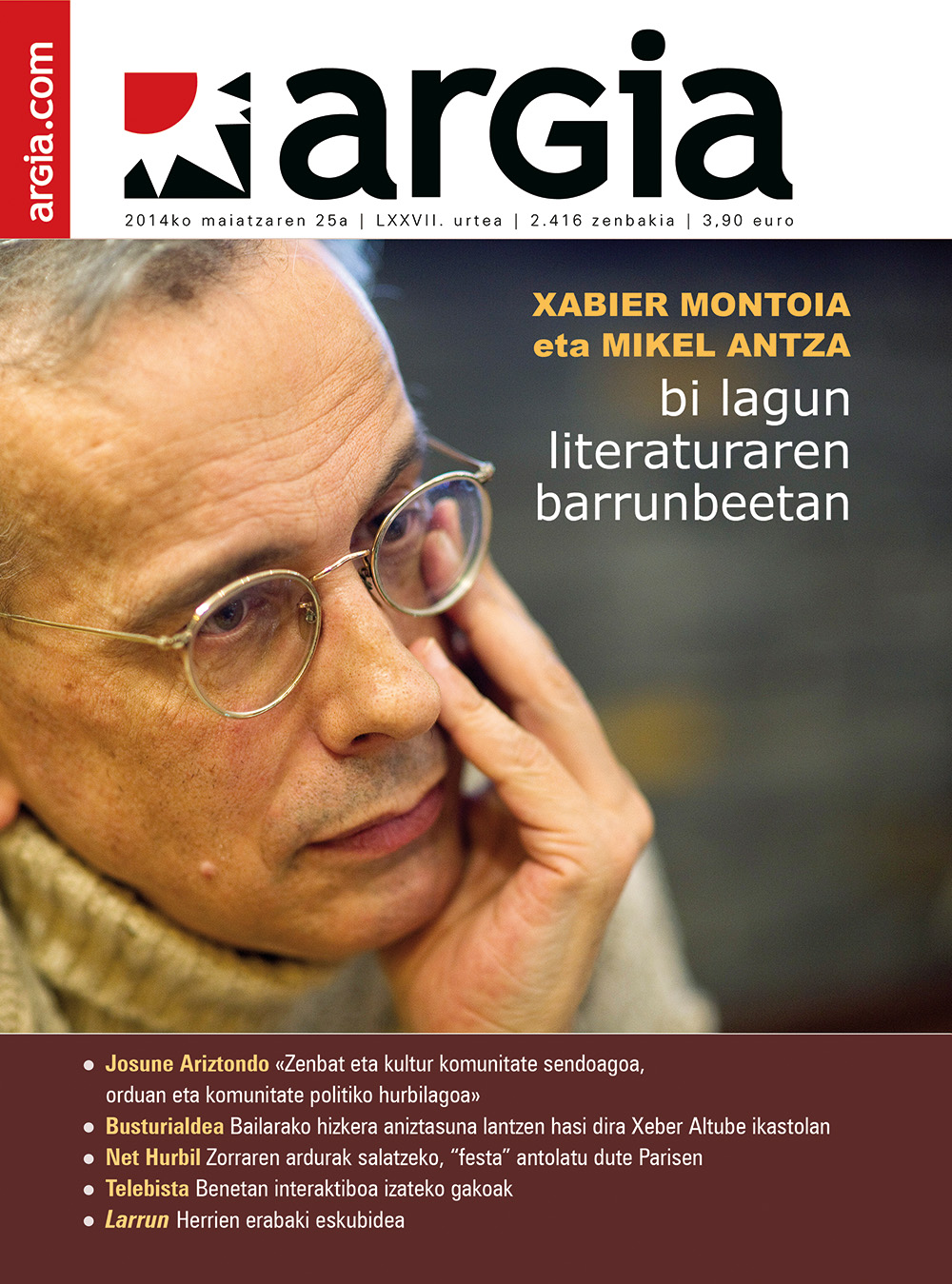Spain 1, Argentina 0
UNIVERSAL JUSTICE is a theoretically exciting concept for anyone to do whatever they want in the world and to know that if what is considered a global crime is committed, it will be persecuted and, if necessary, punished throughout the world. But what is a crime and what isn't there in the world? There's one of the many steps. Many things are already defined in the UN and in the international treaties on justice: mass killings without judicial cause, torture, disappearances… and many others that have been tried here under this concept. These days there is Argentine Judge María Servini investigating the crimes committed during the Franco regime in Spain and in the Basque Country. Coming from Argentina to investigate? Curiously, no doubt, because the citizen is not very used to hearing about universal justice – the states in general do not give him any apology – and also because he makes us think why he has to come from Argentina and why the Spaniards do not investigate him.
In fact, the Spanish Justice has not lagged behind in the last 20 years as regards the entry into force of universal justice. He has investigated the crimes committed in several dictatorships in South America and has imposed penalties on those convicted. Among the cases of disappearance and torture in Argentina, in 2007 the Spanish Supreme Court sentenced the Argentine military Adolfo Scilingo to 1,089 years in prison for participating in the arrest, torture, death or disappearance of nearly 300 people in Argentina in 1976 and 1977. He was arrested in Mexico, in Scilín, extradited to Spain, tried and convicted. He is currently serving a sentence in prisons in Spain.
All in the name of universal justice and with the impetus, among others, of star Judge Baltasar Garzón. Garzón has been one of the greatest stimuli of the ETA doctrine, such as the one that led to the closure of Egin, or the one that saw dozens of Basque citizens torn apart by torture, without moving a finger against it. Taking advantage of the favorable Scilingo penalty wind, he began investigating the crimes that occurred during the Franco regime in 2008. And that's where he found the wall of Spanish justice: The prosecution of the National Court, under the government of Zapatero of the PSOE, opposed the investigations, was denounced for prevarication and trial. He was acquitted at the time, but the sentence served to close the way of the investigation against Franco. Later, the pp government has closed the doors to him through the recent reform of universal justice. The consequence was curious: Spain can investigate and punish someone for crimes committed during the Argentine dictatorship (e.g. in Scilin), but the crimes of Franco cannot be investigated. The contradiction is scandalous, one of the many obstacles that universal justice finds in the way. Spanish judges also know about these kinds of obstacles. Judge Santiago Pedraz investigates the murder of the José Couso camera. An American tank shot him in Iraq. The wall is insurmountable –EE.UU. They have already told her that she has a party – but Pedraz continues with the research.
Judge María Servini also continues to believe in universal justice and, after taking into account the allegations against Franco in Argentina, also with the investigation. He requested the extradition of Antonio González Pacheco Billy El Niño to Argentina. Spain denies it. And since Spain does not investigate, he comes to Spain. If Spain judged Scilin, why not Billy the Child? Logic and justice. In this case the Spanish Justice has put the wall, the National Court: the crime is prescribed.
That with JUSTICE what is appropriate is not new, be it universal or not. Spain knows some of that. A judge tells a 2002 case in El País (19-5-2014) as a witness. In April 2002, the Spanish security forces arrested two French spies who allegedly committed a stab attack in Marbella, France. At the request of the French Government, the Government of José María Aznar, through a public prosecutor’s office, ordered the dismissal of the case and both spies were released by October 2002. And France, in the name of justice, continued to extradite its ethnic groups.
Bidali zure iritzi artikuluak iritzia@argia.eus helbide elektronikora
ARGIAk ez du zertan bat etorri artikuluen edukiarekin. Idatzien gehienezko luzera 4.500 karakterekoa da (espazioak barne). Idazkera aldetik gutxieneko zuzentasun bat beharrezkoa da: batetik, ARGIAk ezin du hartu zuzenketa sakona egiteko lanik; bestetik, egitekotan edukia nahi gabe aldatzeko arriskua dago. ARGIAk azaleko zuzenketak edo moldaketak egingo dizkie artikuluei, behar izanez gero.
A few weeks ago, the President of the European Union, Ursula von der Leyen, reported on the need for military spending of eight hundred billion euros. This expenditure is said to be in response to a military threat to which Europe is exposed, and it has been confirmed that there... [+]
The Department of Education reported on diagnostic evaluations in February: He talked about the mid-stage of 2023 and the end-stage of 2024. Since the disastrous results would show that we have a structural problem, the department decided to comply with the procedure (publish... [+]
Totally dedicated to the tendency of dispersion that we carry in the genes that I was walking down the street, in some useless abstraction that distracts you from the physical and curricular paths. A girl who hasn't turned thirty before. Something fell out of his pocket. The girl... [+]
I have to clean two different places at the same time. Not an ordinary cleanliness, but something that forces us to explore in a different way the landscapes that surround us in our day to day, which also makes us move the structures within ourselves along with the external... [+]
Bilboko Kafe Antzokian, hemen argitaratutako nire kolaborazioen bilduma den Zapalduon pedagogia liburuaren aurkezpenean, entzuleen arteko emakume batek bota zidan galdera. Ohikoak ditudan gaiak aletuz joana nintzen hitzaldian, eta Euskal Herriaren egungo egoeraren kezka jada... [+]
Professor Jeffrey Sachs of Columbia University is interviewed by Yanis Varoufakis on the DiEM25 movement’s YouTube channel. This explains that in international politics the United States of America plays poker, Russia plays chess and the Chinese play Go. The latter was... [+]
Last week, during the blackout, seeing ourselves vulnerable, we began to investigate many people in order to understand what happened: how does the infrastructure that transports electricity work? Why is it getting old? I am fascinated by the physical phenomenon of electricity... [+]
Euskadi markak, eraikuntza sektoreko ekonomiaren estrategian, “industrializazioa” mantrarako hitz gisa hartu duela jakinarazi berri du Eusko Jaurlaritzak. Etxebizitza publikoaren eraikuntzan industrializaturiko prozesu eta elementuak lan guztien %65a izatea... [+]
The pandemic has revealed, in all its crudeness, the consequences of the neoliberal model of care for the elderly, children and the dependent population. Now is the time to consolidate the critical discourses and community alternatives that flourished during the lockdown.”... [+]
“Even with all the shortcomings, the unions have done more for humanity than any other human organization that has ever existed. They have contributed more to dignity, honesty, education, collective well-being and human development than any other association of people.” ... [+]





















